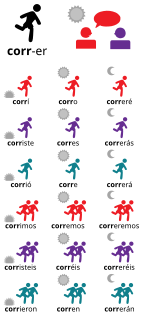 W
WA creole language, or simply creole, is a stable natural language that develops from the simplifying and mixing of different languages into a new one within a fairly brief period of time: often, a pidgin evolved into a full-fledged language. While the concept is similar to that of a mixed or hybrid language, creoles are often characterized by a tendency to systematize their inherited grammar. Like any language, creoles are characterized by a consistent system of grammar, possess large stable vocabularies, and are acquired by children as their native language. These three features distinguish a creole language from a pidgin. Creolistics, or creology, is the study of creole languages and, as such, is a subfield of linguistics. Someone who engages in this study is called a creolist.
 W
WA definition is a statement of the meaning of a term. Definitions can be classified into two large categories, intensional definitions and extensional definitions. Another important category of definitions is the class of ostensive definitions, which convey the meaning of a term by pointing out examples. A term may have many different senses and multiple meanings, and thus require multiple definitions.
 W
WIn linguistics, diglossia is a situation in which two dialects or languages are used by a single language community. In addition to the community's everyday or vernacular language variety, a second, highly codified lect is used in certain situations such as literature, formal education, or other specific settings, but not used normally for ordinary conversation. In most cases, the H variety has no native speakers but various degrees of fluency of the low speakers.
 W
WIn linguistics, conjugation is the creation of derived forms of a verb from its principal parts by inflection. For instance, the verb break can be conjugated to form the words break, breaks, broke, broken and breaking. While English has a relatively simple conjugation, other languages such as French and Arabic are more complex, with each verb having dozens of conjugated forms. Some languages such as Georgian and Basque have highly complex conjugation systems with hundreds of possible conjugations for every verb.
 W
WIn linguistic morphology, inflection is a process of word formation, in which a word is modified to express different grammatical categories such as tense, case, voice, aspect, person, number, gender, mood, animacy, and definiteness. The inflection of verbs is called conjugation, and one can refer to the inflection of nouns, adjectives, adverbs, pronouns, determiners, participles, prepositions and postpositions, numerals, articles etc., as declension.
 W
WA prefix is an affix which is placed before the stem of a word. Adding it to the beginning of one word changes it into another word. For example, when the prefix un- is added to the word happy, it creates the word unhappy. Particularly in the study of languages, a prefix is also called a preformative, because it alters the form of the words to which it is affixed.
 W
WA speech community is a group of people who share a set of linguistic norms and expectations regarding the use of language. It is a concept mostly associated with sociolinguistics and anthropological linguistics.
 W
WIn tonal languages, tone names are the names given to the tones these languages use.
 W
WA vernacular or vernacular language refers to the language or dialect that is spoken by people that are inhabiting a particular country or region. The vernacular is typically the native language, normally spoken informally rather than written, and seen as of lower status than more codified forms. It may vary from more prestigious speech varieties in different ways, in that the vernacular can be a distinct stylistic register, a regional dialect, a sociolect, or an independent language. Vernacular is a term for a type of speech variety, generally used to refer to a local language or dialect, as distinct from what is seen as a standard language. The vernacular is contrasted with higher-prestige forms of language, such as national, literary, liturgical or scientific idiom, or a lingua franca, used to facilitate communication across a large area.